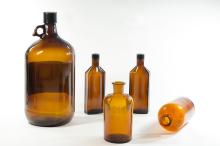The production of amber glass in Germany emits around 0.2 million tonnes of CO2. In a new research project, researchers at TU Freiberg are investigating how the manufacturing process can become greener thanks to an electric glass melting tank. Brown jars and bottles are mainly used for packaging medicine and light-sensitive food. To produce these jars, a brown colour carrier is mixed into the glass batch. Up to now, this mixture has been melted in a glass melting tank heated with gas. A purely electrical heating of the tank is not yet feasible according to the current state of the art, especially with regard to the stability of the colour.

Using renewable energy directly
At the Institute for Glass and Glass Technology of TU Bergakademie Freiberg, researchers are now investigating the parameters that influence the brown colour in an electric pilot melting plant. "Once we have identified these parameters, we can specifically optimise the conditions in the glass melt," explains Dr. Khaled Al Hamdan, research associate at the Institute of Glass and Glass Technology and project coordinator. "To this end, we are also investigating alternative raw materials for the formation of the brown colour body."
The goal of the new research project, which officially starts on 1 January 2023, is the stable and reliable production of brown glass with green electricity from renewable sources. "The aim is to ensure consistency of colour, a bubble-free glass and stabilisation of the so-called cold batch blankets on the melt, which is important for mitigating radiation losses as well as evaporation of volatile components," says the project coordinator.
Research project with industrial partners
The research project will be organised and funded by the project management organisation AiF-IGF-Forschungsvereinigung for the next two years. The research results will benefit supplier companies in the field of glass melting systems and plant technology (mostly small and medium-sized enterprises in the project-accompanying committee) as well as glass manufacturing companies.
Dr.-Ing. Khaled Al Hamdan, khaled [dot] alhamdan [at] igt [dot] tu-freiberg [dot] de